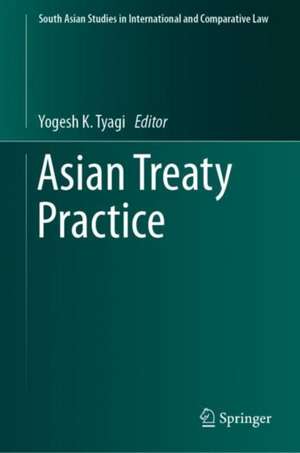Asian Treaty Practice: South Asian Studies in International and Comparative Law
Editat de Yogesh K. Tyagien Limba Engleză Hardback – 30 noi 2024
Preț: 668.96 lei
Preț vechi: 735.12 lei
-9% Nou
Puncte Express: 1003
Preț estimativ în valută:
128.03€ • 132.64$ • 106.84£
128.03€ • 132.64$ • 106.84£
Carte nepublicată încă
Doresc să fiu notificat când acest titlu va fi disponibil:
Se trimite...
Preluare comenzi: 021 569.72.76
Specificații
ISBN-13: 9789811689338
ISBN-10: 9811689334
Ilustrații: XIX, 248 p. 1 illus.
Dimensiuni: 155 x 235 mm
Ediția:1st ed. 2024
Editura: Springer Nature Singapore
Colecția Springer
Seria South Asian Studies in International and Comparative Law
Locul publicării:Singapore, Singapore
ISBN-10: 9811689334
Ilustrații: XIX, 248 p. 1 illus.
Dimensiuni: 155 x 235 mm
Ediția:1st ed. 2024
Editura: Springer Nature Singapore
Colecția Springer
Seria South Asian Studies in International and Comparative Law
Locul publicării:Singapore, Singapore
Cuprins
Asian Treaty Practice: An Introduction.- Bangladesh Treaty Practice.- Asian Treaty Practice and India’s Position.- Japanese Treaty Practice.- Asian Treaty Practice and Malaysia.
Notă biografică
Prof. Yogesh K. Tyagi is a member of I’Institut de Droit International and former Vice-Chancellor of the University of Delhi, India. He holds an LLM from Columbia University School of Law, and a Masters in Philosophy and a PhD in International Law from Jawaharlal Nehru University. He has been the founding Dean of the Faculty of Legal Studies at South Asian University (an international university set up by SAARC nations) and Dean of School of International Studies at Jawaharlal Nehru University and also Professor of Law at the City University of Hong Kong.
Textul de pe ultima copertă
This book surveys the treaty practice of Asian States. It undertakes a study of nine prominent Asian States, namely Bangladesh, India, Japan, Malaysia, Nepal, People’s Republic of China, Republic of Korea, Sri Lanka and The Philippines. One chapter each deals with the treaty practice of these States by reflecting on the theoretical foundations of treaty practice at the domestic level, including a query whether the State follows the theory of monism or dualism or a mix of these two; the relationship between treaties and the Constitution; the relationship between treaties and legislation; and the relationship between treaties and domestic customary law, if any. The chapters also review the participation of the respective States in the drafting of the 1969 Vienna Convention on the Law of Treaties (VCLT); position on and reservations to the VCLT; and reference of the VCLT in the treaties concluded by the States. Other aspects covered in chapters include constitutional provisions relating to treaties; domestic law, if any (for example, Nepal has a legislation on treaties); ratification process and practice; judicial practice, covering case law at the domestic level; the position of the State on the interpretation of treaties; and mechanism for the implementation of treaties at the domestic level, if any. The chapters identify leading cases, if any, relating to treaties to which the State was a party before international courts/tribunals. It deals with treaty compliance issues, including response to alleged violations of treaties; termination of treaties, if any; response to termination, if any; and participation in treaty bodies. It provides a panorama of treaties, to which the State is a party, as well as the most conspicuous treaties to which the State is not a party and the reasons thereof. The concluding chapter contains some general observations on Asian treaty practice.
Caracteristici
Discusses the treaty practice of the major Asian States Investigates whether the rules of a treaty are being complied with in good faith Aids readers in identifying changes in the behavior of these States over time
